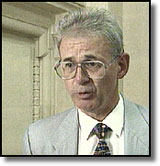
|
Blunkett Unveils White Paper to Transform EducationEducation and Employment Secretary David Blunkett has outlined plans for a comprehensive overhaul of the education system.Unveiling the Government's White Paper, Excellence in Schools, in the House of Commons, Mr Blunkett declared: "Our children are our future. We owe it to them to give them the best start in life."
Mr Blunkett warned that "decisive action" would be taken against failing schools and local education authorities. "Children don't get a second chance in school," he continued. "The White Paper is a vital step in our crusade to raise standards and offer opportunity to all of them. It is time to set aside the cynicism and the culture of complacency. This is a can-do Ggovernment working with a can-do service." The Government has underlined the urgency of its task by underlining some alarming statistics of failure. For example, more than half of 16 year-olds fail to achieve five or more high grade GCSEs, while over one-third of 14 year-olds do not achieve expected levels in English, maths and science. The Government's overhaul of the education system sets out a range of targets to be met by the year 2002. It builds on Tony Blair's oft-quoted pre-election promise that his government's priority will be "education, education and education." The drive for better standards will be led by the Standards Task Force. The Government will also introduce a General Teaching Council, as part of " a new deal for teachers, a new partnership between government and all those involved in education." Mr Blunkett told the House: "The Government values teachers and will celebrate good practice."
Other pledges listed in the White Paper include "Policies to benefit the many, not the few" and "A focus on standards, not structures." By the end of the Government's term in office, it says, "There will be a greater awareness across society of the importance of education and increased expectations of what can be achieved." Specifically, the White Paper promises:
Mr Blunkett's shadow, Stephen Dorrell, claimed that the White Paper vindicated many Tory proposals regarding education. "We always welcome converts to our arguments," said Mr Dorrell. "We are pleased the Government now accepts the case in principle for a parents charter, teacher appraisal, a national curriculum, regular tasting and publication of the test results." But, said, Mr Dorrell, the White Paper's weakness was "the Government's belief that the key to better schools is strong LEAs." He argued that this theory had been "disproved by history and rejected by 1100 grant maintained schools who have chosen the path of greater independence."
Mr Willis asked Mr Blunkett: "Do you believe you can deliver all the promises and commitments in this White Paper on the resources which you have been allocated?". The Education Secretary replied that he could. Nigel de Gruchy, General Secretary of the National Association of Schoolmasters/Union of Women Teachers, said it was the "most ambitious programme for education that I have witnessed in my entire lifetime." However, he warned that the plans "will not survive unless the current massive workload problem is solved."
Read Education Correspondent Mike Baker's "Focus On Education" |
Diana, Princess of Wales, 1961-1997
Conference 97
Devolution
The Archive
News |
Issues |
Background |
Parties |
Analysis |
TV/Radio/Web
Interactive |
Forum |
Live |
About This Site
News |
Issues |
Background |
Parties |
Analysis |
TV/Radio/Web
Interactive |
Forum |
Live |
About This Site
© BBC 1997 |
politics97@bbc.co.uk |


